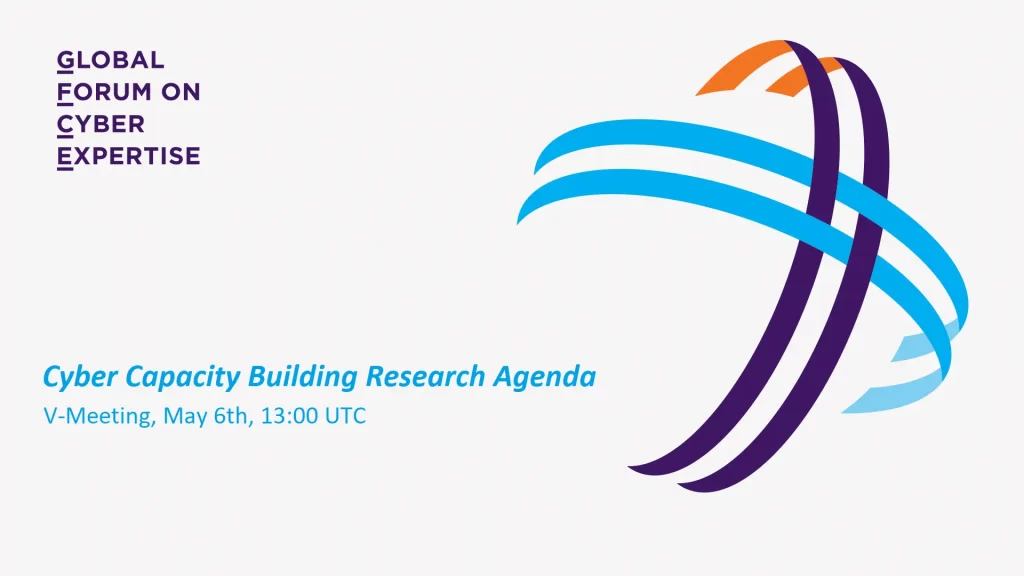Report | GFCE V-Meeting “Cyber Capacity Building Research Agenda” | 6 May 2020
The GFCE Cyber Capacity Building (CCB) Research Agenda is a new mechanism being developed in 2020 to identify and fill knowledge gaps, in line with the GFCE’s efforts to enhance coordination and maximize effectiveness of cyber capacity building efforts globally. The aim of the session was to introduce the new mechanism and gather feedback and ideas from the community to move the process forward. Participants were invited to this consultation session and given the opportunity to provide their input on important first elements of the process, using the interactive software Mentimeter.
David van Duren, Director of the GFCE Secretariat, opened the session and addressed how the idea of the CCB Research Agenda first came about during the GFCE Annual Meeting 2018 in Singapore. In discussing the challenges faced by the GFCE community, it was clear that knowledge gaps existed and the GFCE could potentially address these gaps. David explained that the GFCE Secretariat has had a few consultations with the GFCE Advisory Board on the process and elaborated that the session will allow us to discuss and refine initial ideas so that testing the process with pilot projects can begin in 2020. Kathleen Bei, Advisor at the GFCE Secretariat, then gave a brief presentation on the CCB Research Agenda Lifecycle and explained that the questions today were focused on the first 2 phases – the gathering ideas and agenda-setting phases. Kathleen also elaborated on the first 3 steps in the process, highlighting that this is where the GFCE Community will play a significant role as they come up with ideas and inform prioritization decisions of the CCB Research Agenda. For this reason, the questions prepared on Mentimeter were focused on these initial steps.
The Mentimeter discussion was moderated and chaired by Mr. Enrico Calandro, Co-Director of the Cybersecurity Capacity Centre for Southern Africa and GFCE Advisory Board member. Responding to the first question which looked at ideas of knowledge gaps, many participants identified gaps in designing and implementing cyber capacity building projects including the lack of knowledge on monitoring projects, and metrics to measure impact or effectiveness.
Looking at the CCB Research Agenda process, most participants agreed that the community should be responsible for or consulted on the agenda-setting step. Some of the participants raised the need to clarify between being responsible and being consulted in the process, warning that the sole responsibility does not have to lie with the Community. In the next question on the one-pager with the research question elaborated, most participants identified that the elements to include should be the knowledge gap it aims to address, the relevance or connection to CCB and explanation of the question. Some other suggestions from participants include main implementers, possible partners, and the link to the GFCE mission. Looking at the criterion for agenda-setting in the following question, many participants identified that the research should benefit or have an impact on the GFCE’s mission, objective and/or goals. Another important point that many participants said should be on the criterion is that the research benefits a large population of GFCE members. In response to the question on the length of the CCB Research Agenda lifecycle, most agreed that the cycle should be 1 year. However, some participants raised that while the Agenda and/or commissioning should be done at a set time, harvesting of ideas should be continuous which also would be natural as ideas and/or needs tend to arise from discussions.
In the next question on the Research Committee, the majority of participants agreed with the proposed role as a new entity responsible for advising the WGs on research matters and translating ideas and/or policy questions into research questions with time/cost estimates. Some participants also expressed the need for the GFCE to ensure that there are enough people with the right expertise and time to commit to this role. In discussing who should be a member of the Research Committee, most participants felt that members should have a research-focused background and should already be in the GFCE Community. Participants also expressed that it is more essential to have people with research experience and the right competencies on the Committee, rather than making it a requirement to be part of a WG or Advisory Board. Other suggestions from participants include the availability of time, gender diversity, experience on the ground, and level of interest. In the final question that addresses the formation of the new Research Committee, all participants agreed that it should be done through either targeted outreach or an open call with nominations, and elections are not necessary.
Based on the fruitful discussion and valuable input from the Community, the GFCE Secretariat is working on refining the process and further clarifying roles and responsibilities. If you have more questions or would like to provide further advice or suggestions, please get in contact with us at contact@thegfce.org.
The Mentimeter slides used during the session can be found here.

